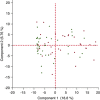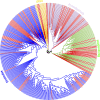Increased rectal microbial richness is associated with the presence of colorectal adenomas in humans
- PMID: 22622349
- PMCID: PMC3446812
- DOI: 10.1038/ismej.2012.43
Increased rectal microbial richness is associated with the presence of colorectal adenomas in humans
Abstract
Differences in the composition of the gut microbial community have been associated with diseases such as obesity, Crohn's disease, ulcerative colitis and colorectal cancer (CRC). We used 454 titanium pyrosequencing of the V1-V2 region of the 16S rRNA gene to characterize adherent bacterial communities in mucosal biopsy samples from 33 subjects with adenomas and 38 subjects without adenomas (controls). Biopsy samples from subjects with adenomas had greater numbers of bacteria from 87 taxa than controls; only 5 taxa were more abundant in control samples. The magnitude of the differences in the distal gut microbiota between patients with adenomas and controls was more pronounced than that of any other clinical parameters including obesity, diet or family history of CRC. This suggests that sequence analysis of the microbiota could be used to identify patients at risk for developing adenomas.
Figures





References
-
- Abbolito MR, Ameglio F, Guerrera AM, Citarda F, Grassi A, Sciarretta F, et al. The association of Helicobacter pylori infection with low levels of urea and pH in the gastric juices. Ital J Gastroenterol. 1992;24:389–392. - PubMed
-
- Benjamini Y, Hochberg Y. A Practical and Powerful Approach to Multiple Testing. J Roy Stat Soc B. 1995;57:12.
-
- Bernardet JF, Nakagawa Y, Holmes B. Proposed minimal standards for describing new taxa of the family Flavobacteriaceae and emended description of the family. Int J Syst Evol Microbiol. 2002;52:1049–1070. - PubMed
-
- Bingham SA. Diet and colorectal cancer prevention. Biochem Soc Trans. 2000;28:12–16. - PubMed
Publication types
MeSH terms
Substances
Grants and funding
LinkOut - more resources
Full Text Sources
Other Literature Sources
Medical

